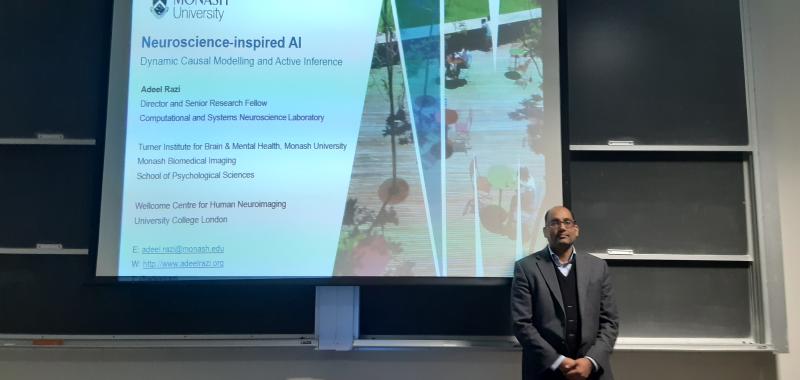
The Department of Electrical Engineering at the Syed Babar Ali School of Science and Engineering (SBASSE) held a talk on ‘Neuroscience-inspired artificial intelligence: Dynamic causal modelling and active inference’ on January 07, 2020. Dr. Adeel Razi, Director, Computational & Systems Neuroscience Laboratory, Monash University, Australia presented the talk.
Dr. Razi’s talk explored the areas of neuroscience and artificial intelligence (AI), which are burgeoning areas of research with a long history of inspiring each other, however, these interactions have been less in recent years. Advances in AI – for e.g., deep learning (DL), essentially a black-box approach, – have revolutionised many areas like computer vision, and pattern and speech recognition. Computational neuroscience on the other hand has largely focused on building mechanistic insights by developing `generative models’ of how the brain implements cognition, memory and decision-making. Using insights from neuroscience can help build intelligent machines that can excel in highly dynamic environments – just as biological brains can and current AI-based systems cannot. Dr. Razi described a generative (Bayesian) modelling approach (i.e., dynamic causal modelling, DCM) to model brain function and how it has successfully been used in conjunction with non-invasive brain imaging. He also discussed active inference (a corollary of the free energy principle): an approach to understanding behaviour that rests upon the idea that the brain uses an internal generative model to predict incoming sensory data. Active inference can be summarised as self-evidencing, in the sense that action and perception can be cast as maximising Bayesian model evidence, under generative models of the world. He concluded by showcasing recent developments in in-vitro active inference leading towards a proof of principal showing cultured neurons in a lab can be trained to play a game of pong.
Dr. Razi’s research interest is in modelling complex, multi-scale, network dynamics of brain structure and function. He uses these (dynamic causal) models to integrate empirical data from multiple modalities (e.g. functional and diffusion MRI) to investigate basic brain and disease mechanisms. Dr. Razi is an Australian at the Monash University. He recently established Computational and Systems Research Council DECRA Fellow Neuroscience Laboratory at the Turner Institute of Brain and Mental Health and Monash Biomedical Imaging. He is also an Honorary Senior Research Associate at the Wellcome Centre for Human Neuroimaging of University College London where he also worked from 2012 to 2018. He received the BE degree in Electrical Engineering (with a Gold Medal) from the N.E.D. University of Engineering & Technology in Pakistan, MSc degree in Communications Engineering from the University of Technology Aachen (RWTH), Germany, and PhD degree in Electrical Engineering from the University of New South Wales, Australia in 2012. His industrial stints include employment with Broadcom Corporation as Staff Scientist and internships with Infineon Technologies and Delphi Delco Electronics GmbH, Germany. He also consults for several start-up companies in Melbourne.







